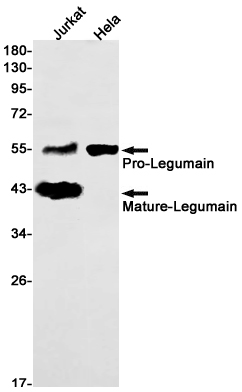
| WB | 1/500-1/1000 | Human,Mouse,Rat |
| IF | 咨询技术 | Human,Mouse,Rat |
| IHC | 咨询技术 | Human,Mouse,Rat |
| ICC | 技术咨询 | Human,Mouse,Rat |
| FCM | 咨询技术 | Human,Mouse,Rat |
| Elisa | 咨询技术 | Human,Mouse,Rat |
| Aliases | AEP; cysteine 1; Legumain; LGMN; LGMN1; PRSC1 |
| Entrez GeneID | 5641 |
| WB Predicted band size | Calculated MW: 49 kDa; Observed MW: 56,46,37 kDa |
| Host/Isotype | Rabbit IgG |
| Antibody Type | Primary antibody |
| Storage | Store at 4°C short term. Aliquot and store at -20°C long term. Avoid freeze/thaw cycles. |
| Species Reactivity | Human |
| Immunogen | Recombinant protein of human Legumain |
| Formulation | Purified antibody in TBS with 0.05% sodium azide,0.05%BSA and 50% glycerol. |
+ +
以下是3篇与Legumain抗体相关的研究文献概览(信息基于公开研究整理):
1. **《Legumain protease-activated T cell-targeted antibody-drug conjugates》**
*作者:Guo et al.*
**摘要**:研究开发了一种新型抗体-药物偶联物(ADC),通过Legumain蛋白酶激活的靶向T细胞抗体,增强肿瘤微环境中特异性药物释放,提高抗癌疗效。
2. **《Legumain/asparaginyl endopeptidase: A potential therapeutic target for cancer》**
*作者:Chen et al.*
**摘要**:综述Legumain在肿瘤进展中的功能,提出其作为诊断标志物和治疗靶点的潜力,并讨论了针对Legumain的单克隆抗体在癌症检测与治疗中的应用。
3. **《Autoantibodies to legumain in patients with inflammatory bowel disease》**
*作者:Liu et al.*
**摘要**:发现炎症性肠病(IBD)患者血清中存在抗Legumain的自身抗体,提示Legumain可能参与肠道炎症的免疫反应,为疾病机制研究提供新方向。
如需具体文献来源,建议通过PubMed或Google Scholar检索标题或作者获取全文。
Legumain, also known as asparaginyl endopeptidase (AEP) or LGMN, is a cysteine protease belonging to the C13 family. It is primarily localized in lysosomes and endosomes, where it functions in protein degradation, antigen processing, and cellular homeostasis. Legumain exhibits unique substrate specificity, cleaving peptide bonds after asparagine or aspartic acid residues, and plays roles in diverse physiological processes, including inflammation, immune regulation, and tissue remodeling. Dysregulation of legumain has been implicated in pathological conditions such as cancer, neurodegenerative diseases (e.g., Alzheimer’s), and atherosclerosis, where its overexpression or abnormal activity contributes to disease progression.
Legumain antibodies are essential tools for detecting and quantifying legumain expression in research and diagnostics. These antibodies are typically developed against specific epitopes of the enzyme, enabling applications in Western blotting, immunohistochemistry (IHC), immunofluorescence (IF), and flow cytometry. Polyclonal and monoclonal variants are available, with validation often including knockout cell lines or tissue controls to ensure specificity. In cancer research, legumain antibodies help study tumor microenvironment dynamics, as legumain is upregulated in many malignancies and associated with invasion, metastasis, and immune evasion. Additionally, therapeutic antibodies targeting legumain are being explored for drug delivery or inhibition strategies. Challenges in antibody development include minimizing cross-reactivity with homologous proteases and ensuring recognition of both pro- and active enzyme forms. Ongoing research continues to clarify legumain's dual roles in health and disease, driving demand for reliable antibody reagents.
×